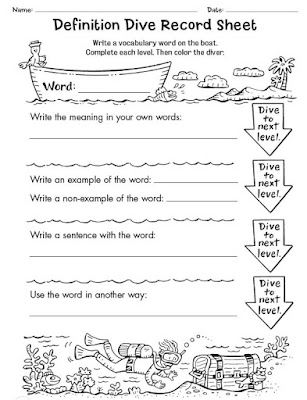Most of the time teachers do not use games in the literature
class. Try this wonderful games which do not require much resources to initiate
with. Teacher can use his/her creativity to enhance, adapt or transform these
games according to the level, number and age group of students. Let your
creativity fly, you will come up with the best out of them.
01. Definition Dive
Definition dive is a fine way to teach vocabulary related to
the text children study. It can be done with or without many resources. The
game can be done in groups, pairs or individually. Pair or group work would be
great. In this way, students will internalize the vocabulary and their usage.
First, pick up the intended vocabulary to teach from the
poem, short story or the text. If you can, you can utilize board stripes or
cards to write the words. Teacher can provide the following worksheet or put an
enlarged version on the board for students to copy down. Students may or may
not be allowed to use a dictionary according to their level.
Teacher can write the word on the board and ask students to
begin. Now, starts the buzzer round. (if possible teacher can arrange a buzzer
in the class or ask students to raise their hands after completing the task.) The
first group or student who finishes will score marks. After all the words
completed, the group/ student scored highest marks will be the winner.
02. Heroes and Heroines
Through this dart game teacher can revise the knowledge of
characterization on a novel, drama or a short story. Students have to describe
the character according to the role in the text. For example: if it is about
character of hero, student has to describe how he becomes the hero and what are
his key characteristics in the story or play.
Teacher has to make a dart board and buy or make a dart. If
it is hard to be done, teacher can draw the dart board on the white board and
make a simple dart using a pencil, suction cup and some super glue. It is
possible to use a toy gun with a suction cup bullet. There are more tactics,
let your creativity flow.
Elect students randomly, ask the student to hit the dart on
the board. According to the target he/she gets, he/she has to describe the
character. Heroes and Heroines get higher marks and supporting characters get
less marks. Make students aware about the rules and the way they get marks.
Adapt rules according to level of students. Your students will surly enjoy
this.
03. Answer Shoot
This game can be used as a warmer or rapid-fire question
types. This will be challenging and enjoyable for students and it will break
ice on your students’ lazy minds and bodies. Teacher will need a ball and a
basketball ring for this. It is not necessary to be a perfect one, I have
created one with an empty chocolate bar container and a simple plastic ball.
Teacher can pre-set a questionnaire consists of short answer
elicit type questions. That means the answers should be one word or a phrase.
This can be done as a time elapsed game. Set the time according to the level of
students.
Take a group to the front of the class; teacher can begin
questioning with the timer, a student in the group has to answer the question
correctly and shoot the ball into the ring. Correct answer+ shooting double the
score. Change rules according to your preferences. Students will be actively
participating in this as it involves their mind and body.
04. Jeopardy
Jeopardy is legendary, as it can be used for teaching any
subject. Teacher can prepare a PowerPoint jeopardy with minimum effort. Here
you can test vocabulary, techniques related to poetry, about incidents,
characters… and much more.
If you have no idea of making a PowerPoint jeopardy,
do it as follows:
a. Open PowerPoint and make the link page (picture 01)
b. Add questions in separate slides: if you want you can add
answers too.
c. Select question number and go to Menu>format>actions>hyperlink
to>slide number (picture 02)
If you do not have time for these things, visit
Factile.com , they will automatically generate an amazing jeopardy for you for free.
Now you have the Jeopardy, take students randomly to
click/touch on question number, and answer the question, if he/she succeeds, he/she
can try for more questions. Award scores and the one who take highest marks
will be the winner. (This is more like the TV program ‘Who want to be a
Millionaire’) Set enough questions according to the number of students
05. Memory play
Students find it hard to memorize quotations and incidents, (personally
I know how hard it is) let’s help them in an interesting way. Provide students
quotations on plays. Ask them to memorize them at home. in the class at random
teacher can get them. Provide marks for proper articulation, dramatization and
memory. Students will compel themselves to by heart the lines which will be
helpful for them in exams. To make it more interesting, teacher can ask
students to act out while repeating the quotes. (Which will be very effective
to remember dialogues in dramas)
I’m sure you have much more interesting activities to
involve students in literature, please share them with the readers of this
blog. Comment your wonderful tact-tics below. Share if you find this useful to
others.













1 Comments
In the second picture, villin should be corrected as villain.
ReplyDelete